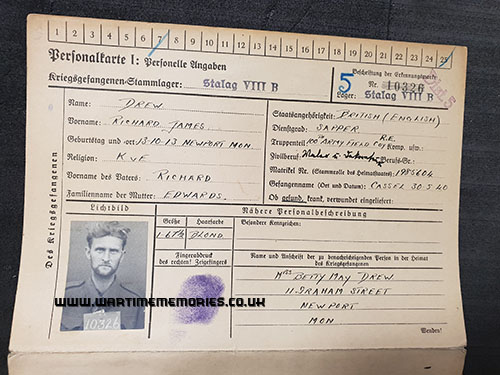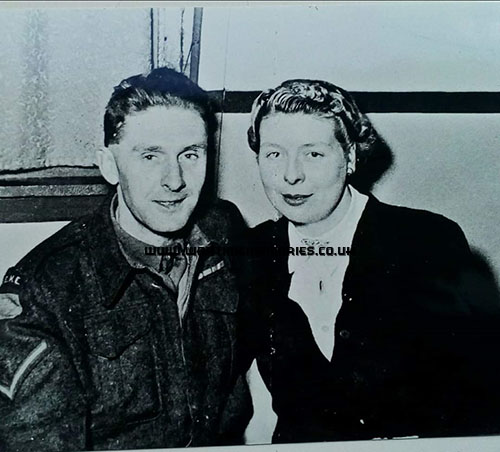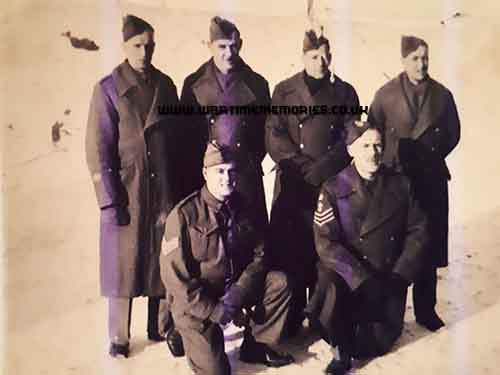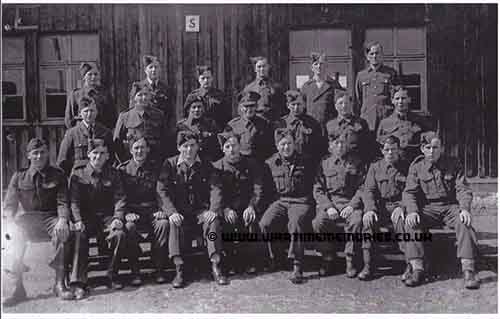Spr. Thomas McCarthy 100th Army Field Company Royal Monmouthshire Royal Engineers
My dad, Thomas McCarthy of the 100th Army Field Company Royal Monmouthshire, Royal Engineers was captured at Wattou, near Dunkirk on 29.5.1940. After a time in Stalag X11A and Stalag 344 he was transferred to Stalag V111B at Teschen on the Polish border. He remained there as a POW (no 15356) until the ‘death march’ on 20.1.1945. On 9 May 1945 he and other survivors crossed American lines at Karlsbad.
Sadly, my Dad died of ill health in 1963 when his three children were very young, so we were never able to talk to him about his time as a POW. But we did have left to us a very small notebook in which he kept a record of the ‘death march’ which is reprinted below. Tom used a pencil stub to bravely keep a record of what happened, despite the risks to him. The original of the notebook in now in the Regimental Museum in Monmouth.
Copy of handwritten log of Sapper Thomas (Tom) McCarthy:-
January 20TH 1945
Started marching, given one loaf 2000grams
January 25th 1945
- 1/3 Loaf 1 kilo 333 grams
- ¼ Loaf 2 Kilo 500 grams
- ¼ loaf 2 kilo 500 grams
- 1/5th loaf 2 kilo 400 grams
- 1/6 Loaf 1800 grms 300 grams
Total: 4033 grams
February 19th 1945:
Stopped marching. For the last 30 days we were given 4033 grams or 8 &4/5lbs of bread, and 2lbs of marg for 42 men and a soup a day except for 4 days when we got a few potatoes. Some parties had Red Cross food to start, but we had none, nor cigs. In the 30 days we marched 420 KM. We stared with 314 English about 400 Russians and 40 labourers.
20th February 1945:
The weather is very cold, everything is freezing. If you take your boots off at night you have trouble to get them on in the morning. If you don’t you cannot sleep with the cold. Some days, and on the forced night march the boots were freezing while marching. The night marching was hell. A lot of men were put in hospital with frost bitten feet and ears. The RMC chap with us told me that some would have to have one foot off and a few would lose two. Seven Russians passed out that first week, I saw three of them at one barn. The only thing that kept me going was the thought that we were going west and that was going home.
24th February 1945:
We have had 250 grams of bread per day since the 19th except for one day it was stopped as two men were found stealing potatoes and one day no soup.
25th February 1945:
Still in the same barn, things are very bad. You can sell one days bread for 3 cigs. Getting weak, blackout when I stand up. A lot have got dysentery and one chap fainted. Lost the Pole last night - I had to get rid of all his clothes. I spend all my time thinking of food. Guards shot Russian for stealing potatoes and planted him ten minutes later in the yard. Sandy gone to hospital. One Red Cross parcel for thirty five men - I got half a tin of Ovaltine.
12th March 1945:
Marched 22 KM west to a new barn. New guards much better. Started with Aussie and Keyes.
15th March 1945:
Weather much better. Had a wash down. First time I’ve had my pants off since starting.
16th March 1945:
Went to bed with pants and pullover off.
25th March 1945:
Letter home and washed down. About thirty men working cutting wood. One or two men to a house.
29th March 1945:
Had half a Red Cross parcel. I went out working for a day and had too much to eat. After so long on so little I’ve been ill all day. I’ve also got piles. Good news heard today that our troops are 240kms west.
5th April 1945:
Marching again- given half a loaf for two days, going to a Stalag- marched 25KM, rained all day.
6th April 1945:
Marched 26KM- its not a Stalag just new huts for the 1200 men. Anyway it’s the finish of the march (we hope). It’s the first time we’ve had a bed since 20th January. We have been having seven men to a loaf, we are hoping it won’t be less.
8th April 1945:
Ten men to a loaf. Met H. Harris, P. Evans, Stan Fowler and G. Franklin. Half the camp is lousy. Can’t get water to drink, but got a parcel a man. I can’t leave the butter alone- I’ve been eating it with a spoon.
13th April 1945:
George away with the NCO- I have not done any work yet been going sick.
14th April 1945:
I had to go to work
16th April 1945:
Five hundred men came to the camp for the night. They say the Yanks are near Dresden. Everyone sent back to the camp from work. We are hoping we’re not off. got 4 cigs a man from the Red Cross.
19th April 1945:
Big air battle over the camp. One 4 engine bomber came down near the camp, and a few further away. No news but all hoping for the best.
20th April 1945:
Things getting bad. Sold my cigs for 1 and ½ loafs. We can hear gun fire. A few planes bombed somewhere west of the camp. We could see the bombs leaving the planes.
21st April 1945:
We can hear guns but cannot tell where or how far away as we're in the hills. Water came on at 2.00 am this morning. I got up and got three soupbowls full for a bath. Found a few lice in my vest.
24th April 1945:
I think we were hoping for too much. Everything gone quiet, no air raids or gunfire. Feel weak when I walk about. Everyone is the same. All you can hear is men talking of food. It don’t worry me now. There is talk of moving. Hope not- if we have to sleep out in the woods it will kill us.
25th April:
They want seven hundred men for work tomorrow- I went sick today but must see MO in the morning. Sold my cigarette lighter for 2 cigars
26th April:
Seen the MO. He told me my chest is all right but there is something wrong with my heart. He did not say what. Anyway no work. Seven hundred men had to go to Pirna.
27th April 1945:
Done some washing, and when I went to get my dinner I had my socks swiped. Heard the Lambsdorf crowd are away.
30th April 1945:
Got a smoke- Kaye sold his socks. Good soup not water.
1st May 1945:
BBC news given out (good). The war must be over they have just given us half a cup of milk at 9.00pm at night, and the soup today was very good.
2nd May 1945:
They came into the hut at 1.00am this morning with the news that Hitler had been killed, and Donitz has taken over, and a few hours later that Berlin has fallen.
3rd May 1945:
BBC news very good. We are all waiting for the finish. Half a cup of milk.
4th May 1945:
Fifty german cigarettes a man, the first since 1940 that we could get. Yesterday bread was 15 cigarettes, this morning it is 3. BBC says the north has fallen. It seems we will be the last. German and Polish MO passed me as unfit to march.
5th May 1945:
Talk of the sick moving and the camp can hear guns
6th May 1945:
Ready to move at 6.00am but not going now until 1.00 don’t know where to, but near a hospital- guns going all night.
7th May 1945:
Left Hohenstine at 1.00pm. Got to Bilin at 10.00pm. Seen the doc at hospital. Left Bilin for Stalag 1Vc (Teplice)- hear the war is over.
8th May 1945:
They say we can march to our lines, or stay- I am moving. 3.00pm over taken by Russians at Dubi.
9th May 1945:
Started marching to the Yanks. Got a lift 28kms that makes 80K. At Karlsbad slept out.
9th May 1945:
Behind the Yank lines!
10th May 1945:
New house at Eger- Slept!










